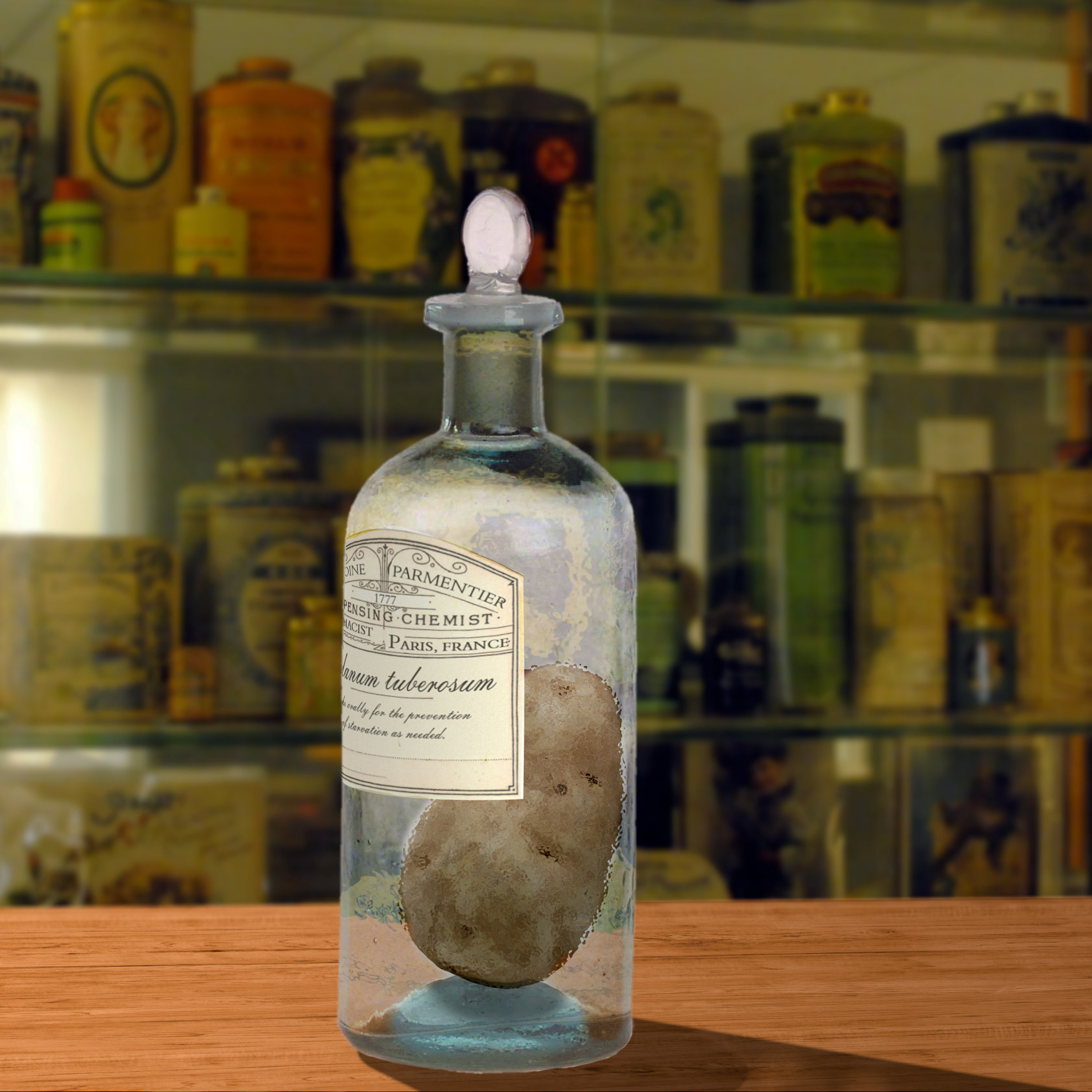
Staple though it is today, the lowly potato had a hard time reaching its preeminent status in Western cuisine. Perhaps its lengthy purgatory has something to do with the tale that when Sir Walter Raleigh gave some potatoes to Queen Elizabeth, her cooks tossed aside the roots and served up the boiled greens instead, causing a court-wide case of indigestion. Whether that's the case or not—and there's no evidence that Raleigh ever so much as set eyes on a potato—for decades Europeans would have nothing to do with the tuber. At best, it was found useful to feed the cattle. At worst, it was considered a leprosy-inducing invention of the devil.
This belief was particularly pernicious in the fair fields of France, a country at the time holding a quarter of Europe's inhabitants despite its periodic decimation by epidemic and famine. By the beginning of the 17th century France's population reached had twenty million and continued to rise. Clearly, a cheap, plentiful, and resilient crop was just what the nutritionist ordered, yet even in the face of the brutal demographic crises that popped up every ten to fifteen years over the next two centuries, each time lopping two or three million inhabitants off the non-existent voting rolls, the potato remained unpondered, unprized, and unplanted.
Clearly, the potato needed a champion. What it got was a pharmacist.
view more
More Episodes
A Trail Gone Cold
 2024-03-20
2024-03-20
 2024-03-20
2024-03-20
Journey To The Invisible Planet
 2023-06-13
2023-06-13
 2023-06-13
2023-06-13
From Where The Sun Now Stands
 2023-05-21
2023-05-21
 2023-05-21
2023-05-21
The Ancient Order Of Bali
 2023-03-28
2023-03-28
 2023-03-28
2023-03-28
Lofty Ambitions
 2022-12-13
2022-12-13
 2022-12-13
2022-12-13
The Rube's Dilemma
 2022-10-27
2022-10-27
 2022-10-27
2022-10-27
Devouring The Heart Of Portugal
 2022-05-03
2022-05-03
 2022-05-03
2022-05-03
The Mount St. Helens Trespasser
 2022-02-28
2022-02-28
 2022-02-28
2022-02-28
Hunting For Kobyla
 2022-02-07
2022-02-07
 2022-02-07
2022-02-07
The Unceasing Cessna Hacienda
 2021-10-25
2021-10-25
 2021-10-25
2021-10-25
The Kingpin of Shanghai
 2021-08-25
2021-08-25
 2021-08-25
2021-08-25
The Traveler And His Baggage
 2021-06-02
2021-06-02
 2021-06-02
2021-06-02
Fifteen Years Forsaken
 2021-04-27
2021-04-27
 2021-04-27
2021-04-27
A Blight On Soviet Science
 2021-03-02
2021-03-02
 2021-03-02
2021-03-02
Pugilism On The Plains
 2020-12-28
2020-12-28
 2020-12-28
2020-12-28
Dupes and Duplicity
 2020-09-04
2020-09-04
 2020-09-04
2020-09-04
Chronicles of Charnia
 2020-06-29
2020-06-29
 2020-06-29
2020-06-29
The Spy of Night and Fog
 2020-05-05
2020-05-05
 2020-05-05
2020-05-05
Radical Solutions
 2020-03-25
2020-03-25
 2020-03-25
2020-03-25
012345678910111213141516171819
Create your
podcast in
minutes
- Full-featured podcast site
- Unlimited storage and bandwidth
- Comprehensive podcast stats
- Distribute to Apple Podcasts, Spotify, and more
- Make money with your podcast
It is Free
- Privacy Policy
- Cookie Policy
- Terms of Use
- Consent Preferences
- Copyright © 2015-2024 Podbean.com




